
Everything You Need to Know About Different Swimming Pool Shapes
When it comes to creating your dream swimming pool, it’s important not to leave things to chance, especially in the world of swimming pool and landscape construction. Nowadays, designers offer a wide variety of pool shapes and styles, from natural-looking freeform pools to elegant infinity edges and classic rectangular ones. To find the right fit, start by getting inspired by your property and what shape suits it best. But before you get too excited, think about the best material to use for building the pool you’re envisioning.
Infinity Pools
Infinity pools create a stunning visual effect. They’re designed to seem like the pool water flows over the edge, blending into the beautiful surroundings. This design uses math and science – the water goes over the pool’s special wall and gets recycled back. Infinity pools work best for homes with amazing views like oceans, cityscapes, mountains, or rivers. But they can also look great in places with lots of nature, like forests or palm tree areas, as suggested by a designer.
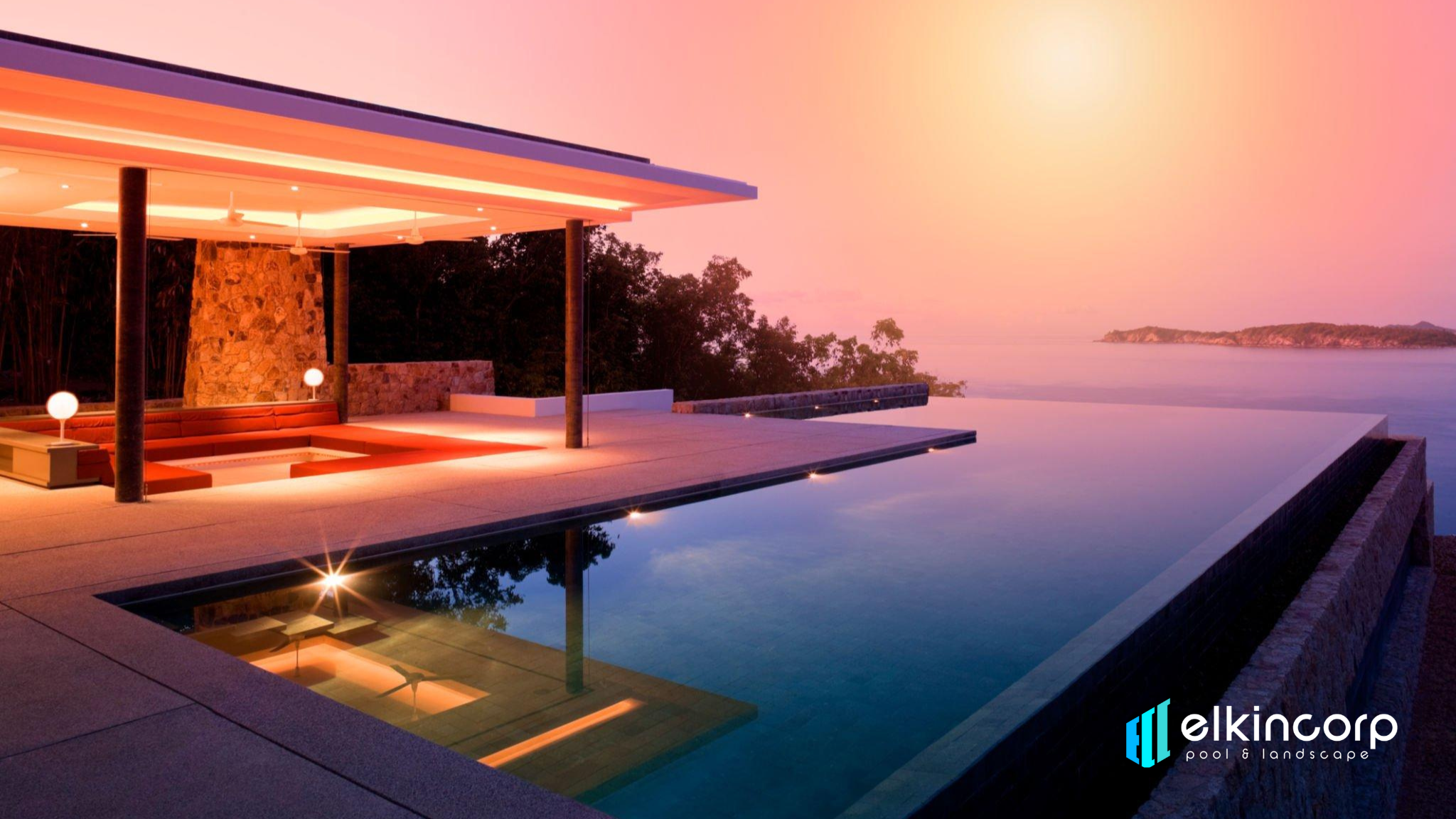
Perimeter-Overflow Pools
Perimeter overflow pools create a cool optical trick. They make it seem like the water is like a mirror and the pool deck is perfectly flat. The water flows over all sides into a special space in the deck, making it look like the pool’s edges disappear. When you look from above or far away, it seems like the pool is part of the deck. But you’ll only see the cool effect when something like the wind or a movement makes ripples on the water’s surface. If you’re interested in this, talk to a swimming pool construction company for more info.
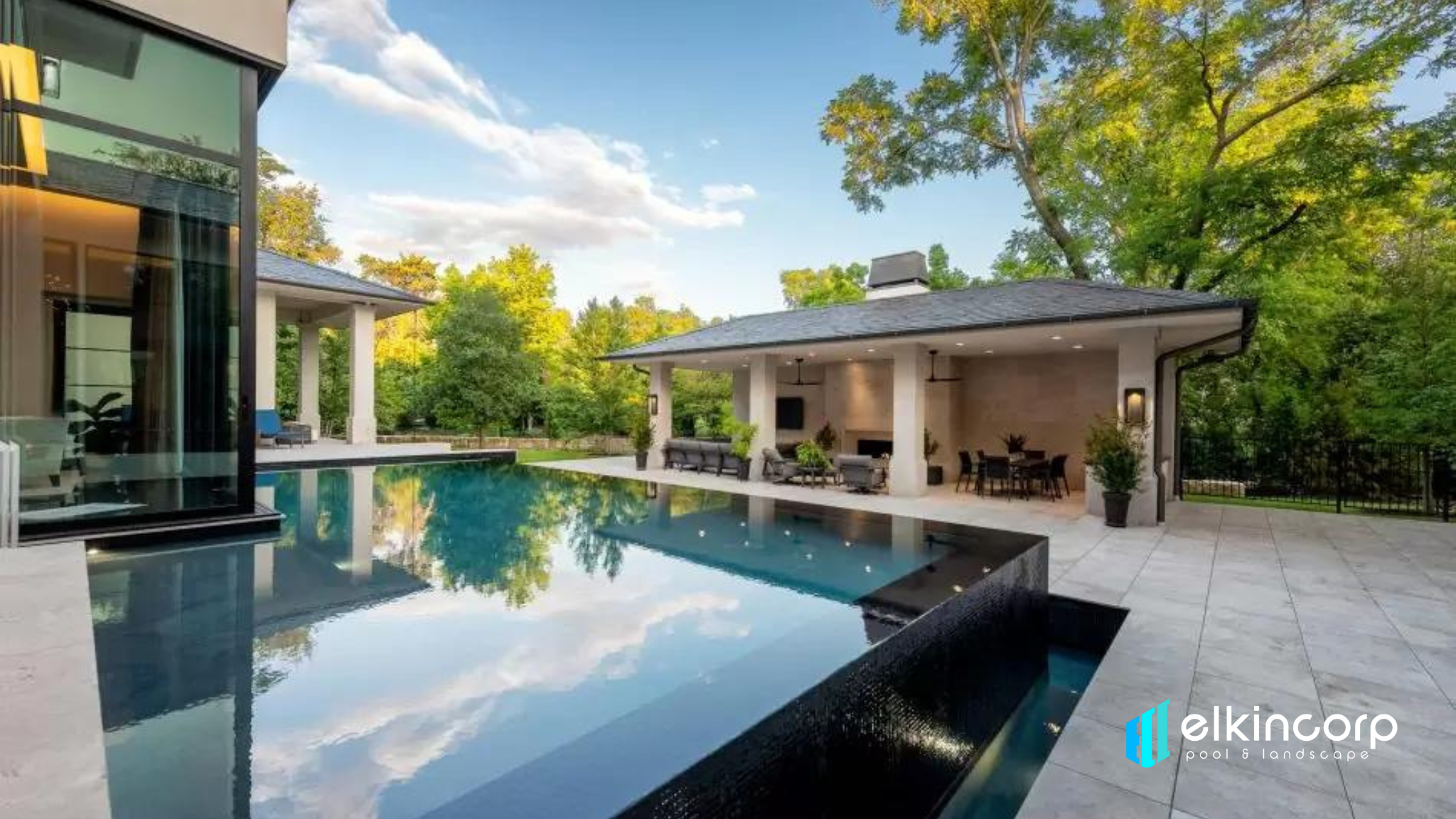
Freeform Pools
Freeform pools are called that because they don’t have to follow regular shapes like squares or rectangles. They can be whatever the designer imagines, which makes them great for many types of properties. Homes in rustic, tropical, or natural places work really well with freeform pools because they fit in perfectly with the surroundings. They can look like they’ve always been there and be part of the landscape. With creative landscaping, hardscaping (like paths and walls), and lighting, a freeform pool can look like a peaceful waterway, a hidden paradise, or a tropical lagoon.
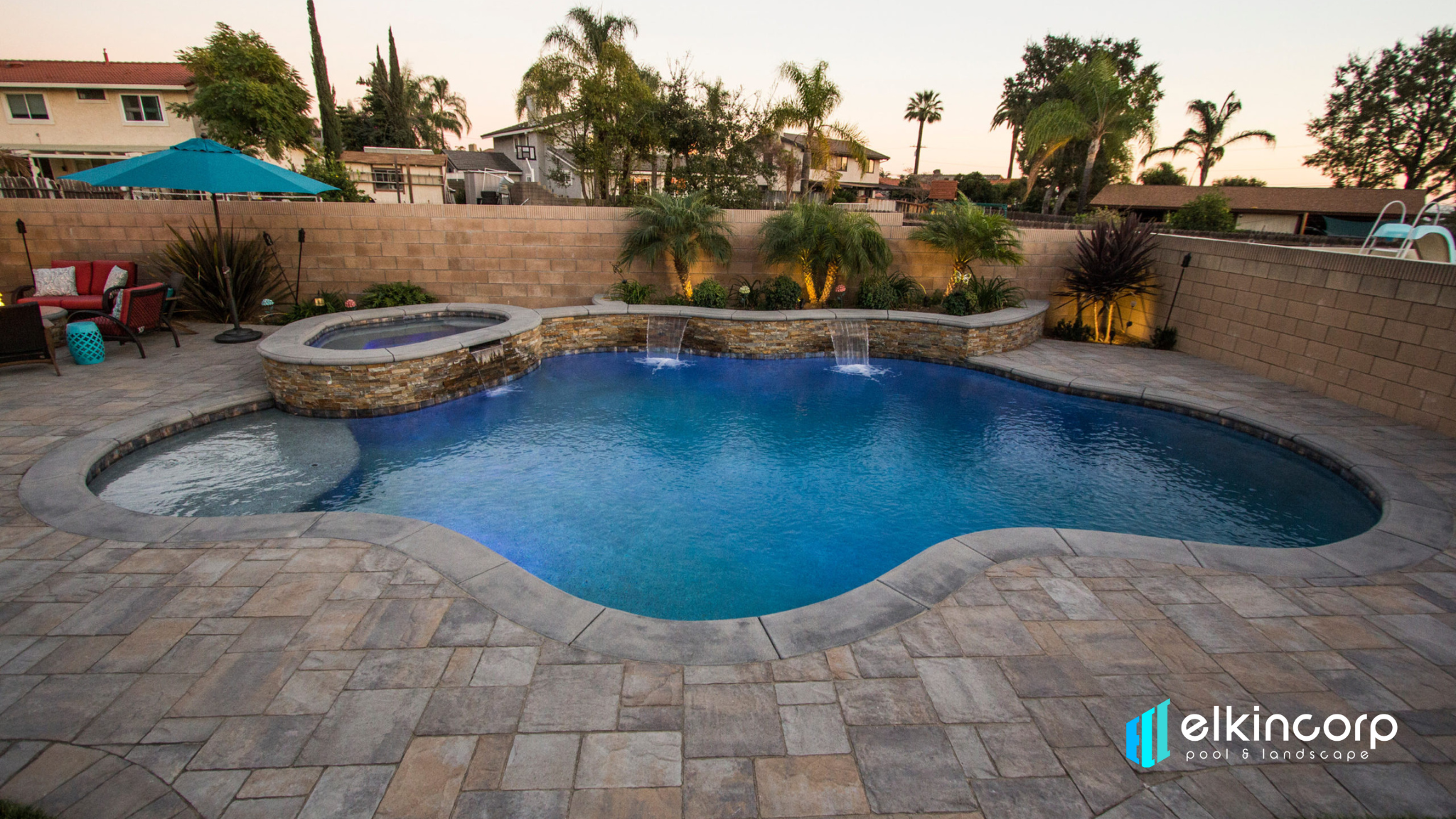
Geometric Pools
Geometric pools are super precise and use math to look really sharp. They can also have fancy extras like fountains, spillways, overflow edges, and disappearing edges, which makes them a top pick for people who want something very stylish. These pools have lots of squares, triangles, rectangles, and other carefully designed shapes, so they work best for modern-style properties. If you’re in Dubai, consider talking to a pool and landscape company in dubai for this kind of pool design.

Skimmer Pool
A skimmer pool, also known as a “skimmer box pool,” is a type of swimming pool design that incorporates a skimmer system to help maintain the cleanliness of the pool water. The primary function of a skimmer pool is to remove debris, like leaves, insects, and other floating contaminants, from the pool’s surface. This helps keep the pool water clean and clear.
The skimmer system typically consists of one or more skimmer boxes installed at the pool’s edge or along the sides. These skimmer boxes are connected to the pool’s circulation system. Water is drawn into the skimmer box by the pool’s pump, and the debris is collected in a strainer basket within the skimmer box. The pump then sends the clean water back into the pool after removing debris.
Skimmer pools are popular for their ability to effectively maintain water quality by preventing surface debris from going to the bottom of the pool, where it can be more challenging to remove. They are commonly found in residential and commercial swimming pools and are an essential component of pool maintenance systems.
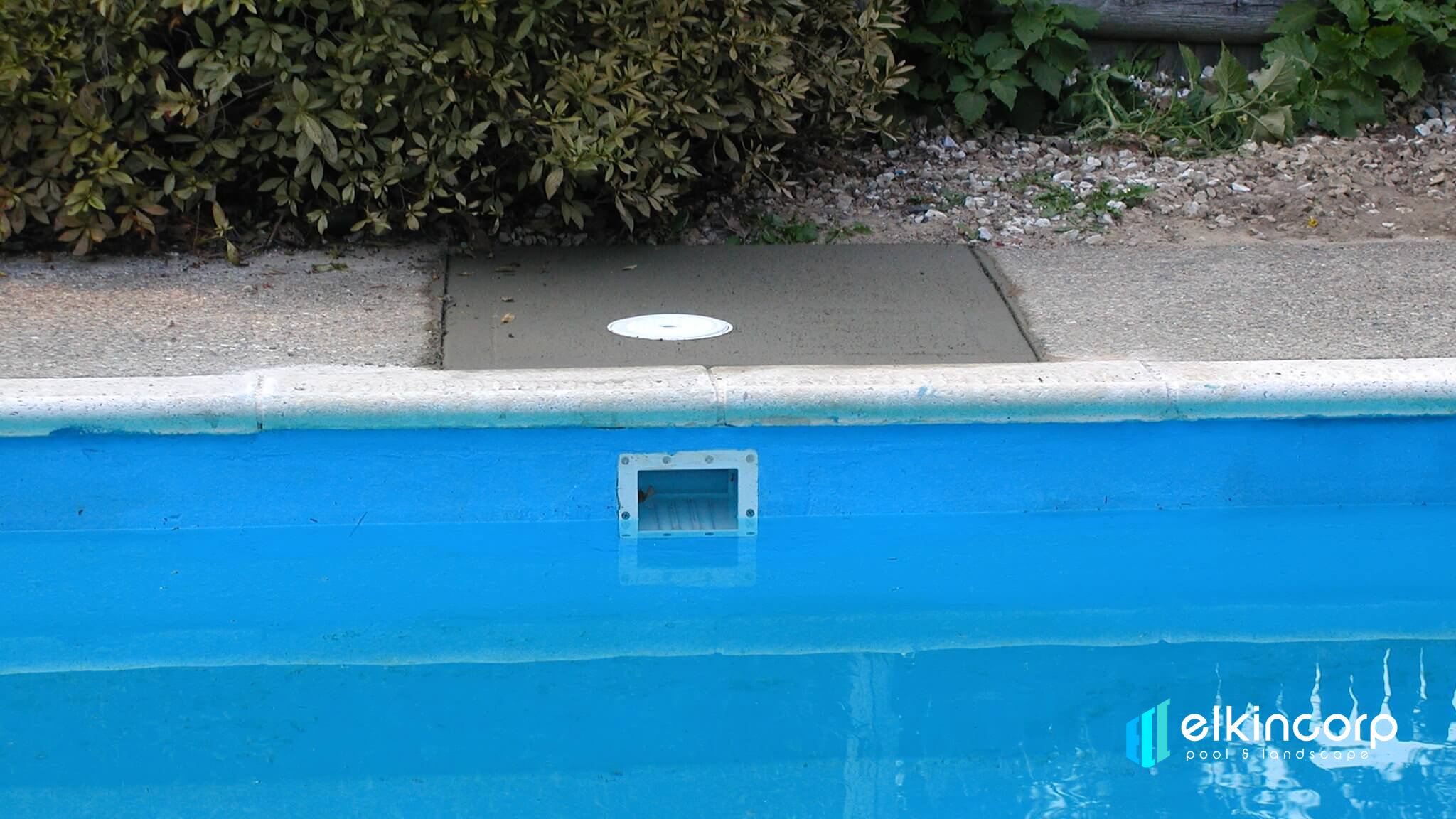
Overflow with Infinity Edge Pool
An “overflow with infinity edge pool,” often referred to as an “infinity edge pool” or “infinity pool,” is a kind of swimming pool design that creates a visually stunning effect by making it appear as though the water extends to the horizon, that gives an impression that the pool has no visible boundary.
This type of pool is designed with one or more edges that have no discernible wall or barrier. The water level in the pool is designed to align perfectly with the edge, allowing it to flow over the edge and into a basin, also known as a surge tank. From there, the water is pumped back into the main pool, creating a continuous circulation.
The visual effect of an infinity edge pool is created by having the water overflow the edge, and the pool’s design is often incorporated in locations with beautiful vistas, such as overlooking the ocean, a lake, or a scenic landscape. The illusion of the water seemingly merging with the surrounding environment or appearing to have no boundary gives the pool a luxurious and serene appearance.
Infinity edge pools are known for their aesthetic appeal and are a popular choice for high-end resorts, upscale residences, and properties with breathtaking views. They require precise engineering and design to achieve the desired visual effect while maintaining proper water circulation.
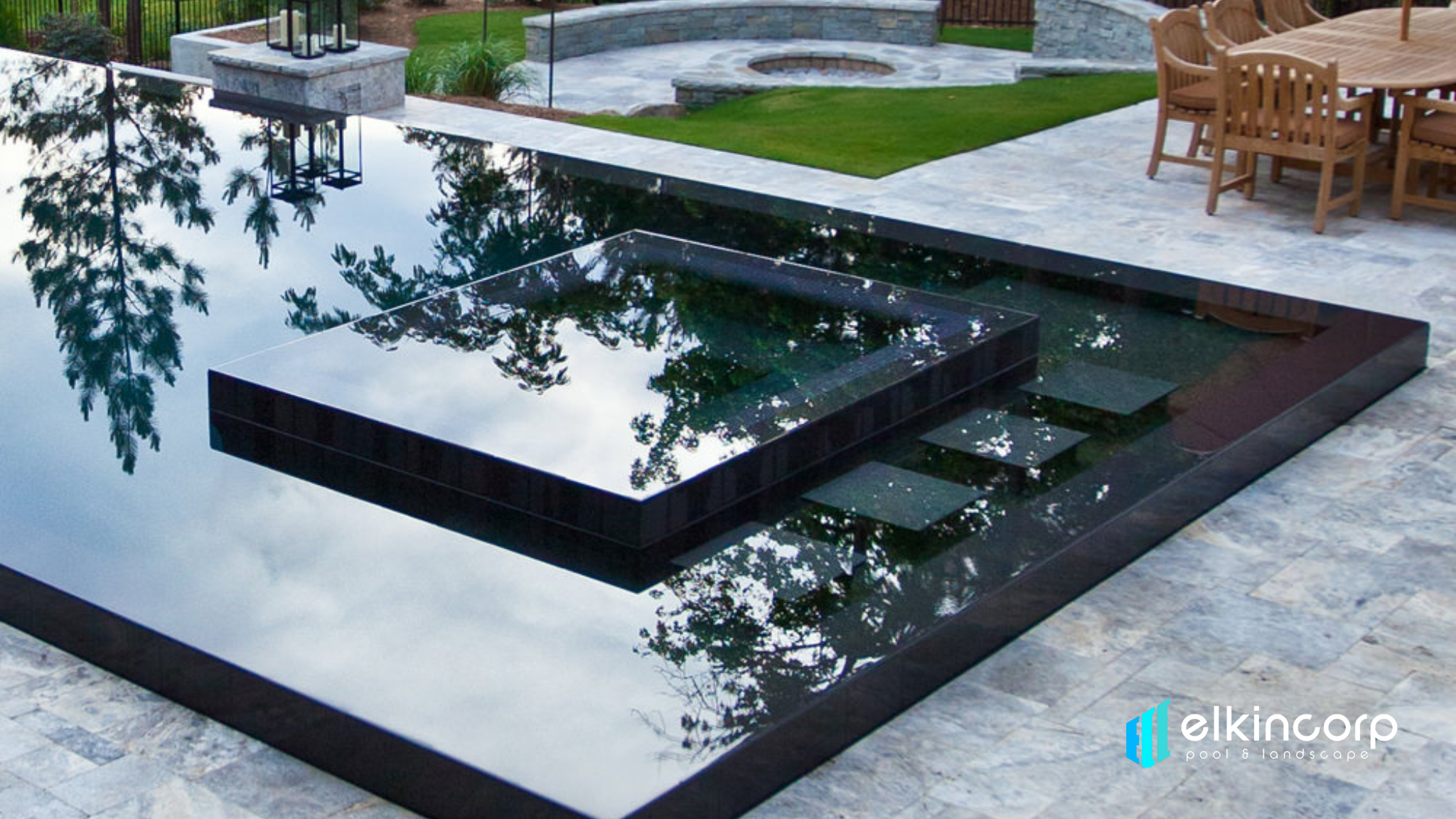
skimmer with Infinity Edge Pool
A “skimmer with infinity edge pool” combines two distinct features in swimming pool design: a skimmer system and an infinity edge (also known as a vanishing edge or negative edge) design. Let’s break down how these features can be integrated into one pool:
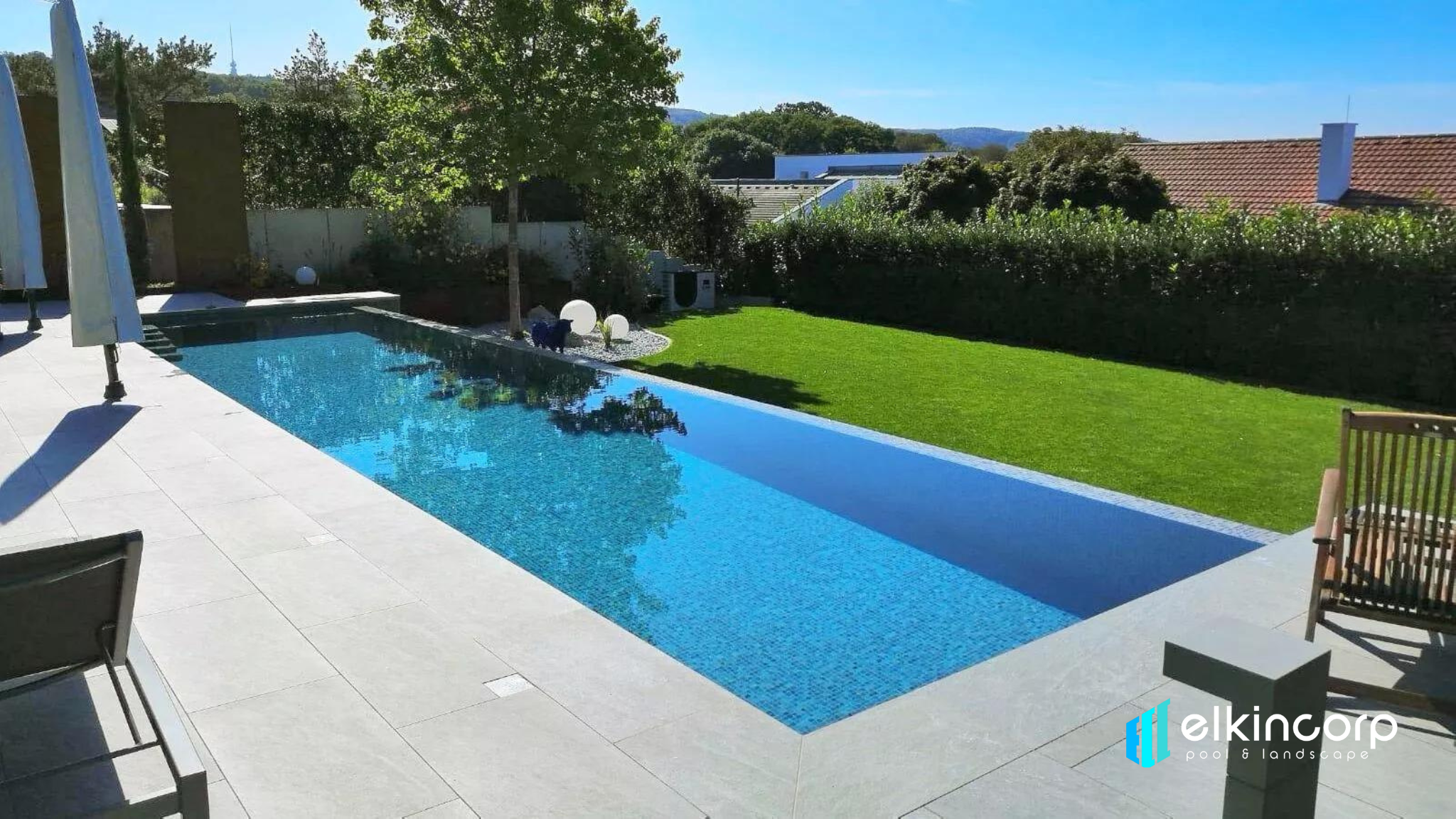
Skimmer System
A skimmer system in a pool is a component that helps to remove debris, such as leaves, insects, and other surface contaminants, from the water’s surface. Skimmer boxes are installed along the sides of the pool, and they use a pump to draw water into them, allowing debris to be collected and filtered out. Skimmer systems are essential for maintaining clean and clear pool water.
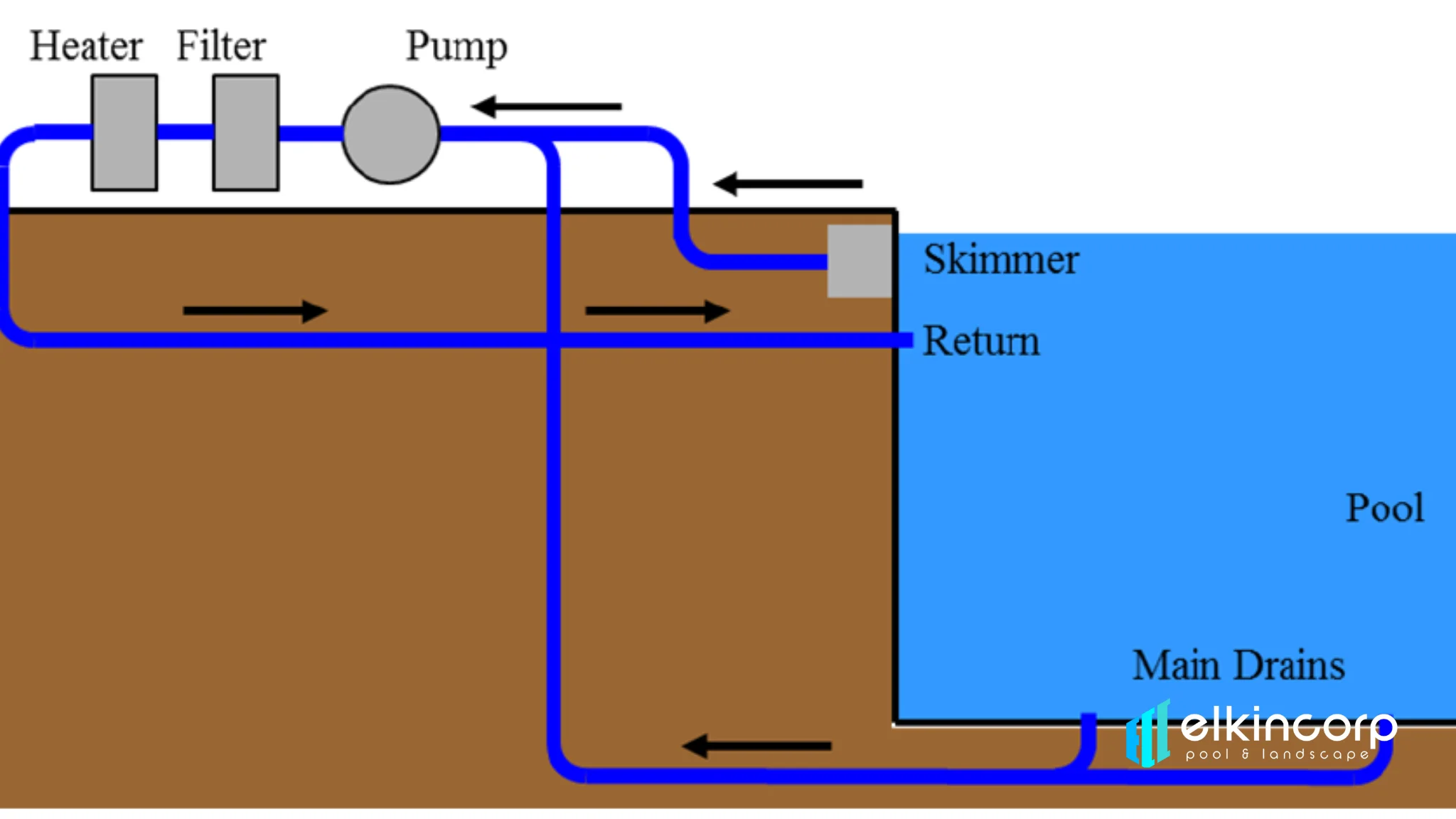
Infinity Edge Design:
An infinity edge pool is designed to create a visually striking effect by making it appear as though the pool’s water extends infinitely to the horizon, with no visible boundary. This effect is achieved by having one or more edges of the pool slightly raised and designed to overflow. The overflow water flows into a catch basin (surge tank) and is recirculated back into the pool, creating a continuous circulation. This design is often used in settings with stunning views.
When you combine these two features, you have a swimming pool that has the aesthetic beauty of an infinity edge pool while also incorporating a skimmer system for debris removal. The skimmer system can be discreetly integrated into the design, often along the sides of the pool or within the catch basin, to help maintain the cleanliness of the pool water.
This combination offers the best of both worlds: the captivating visual appeal of an infinity edge pool and the practical functionality of a skimmer system for water maintenance. It’s a popular choice for those who want a stunning pool with an unobstructed view while still prioritizing cleanliness and ease of maintenance.
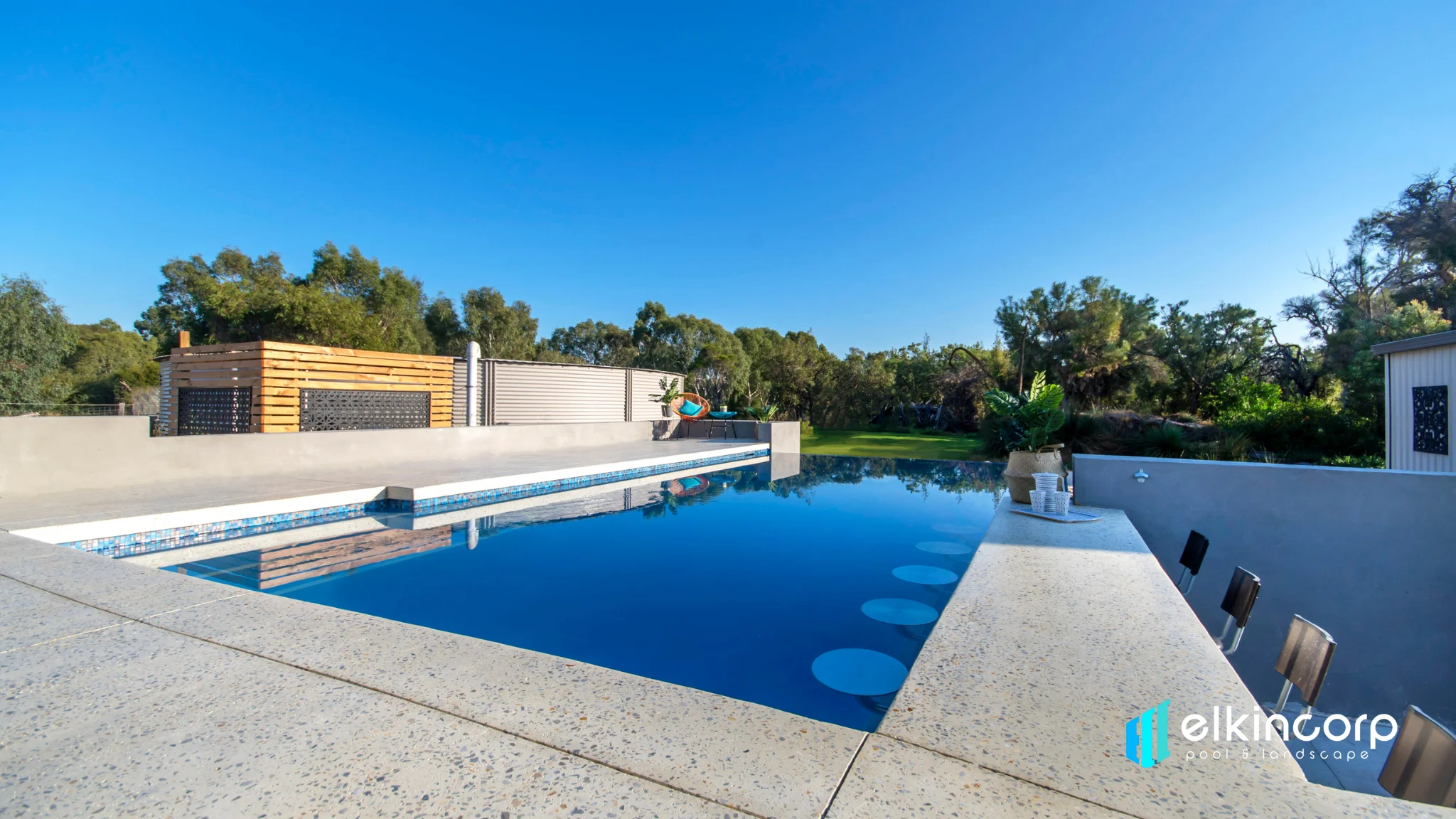
Above-Ground Pools
An above-ground swimming pool that is installed above the ground level, typically as a freestanding structure. These pools are popular for various reasons, including their affordability, ease of installation, and flexibility.
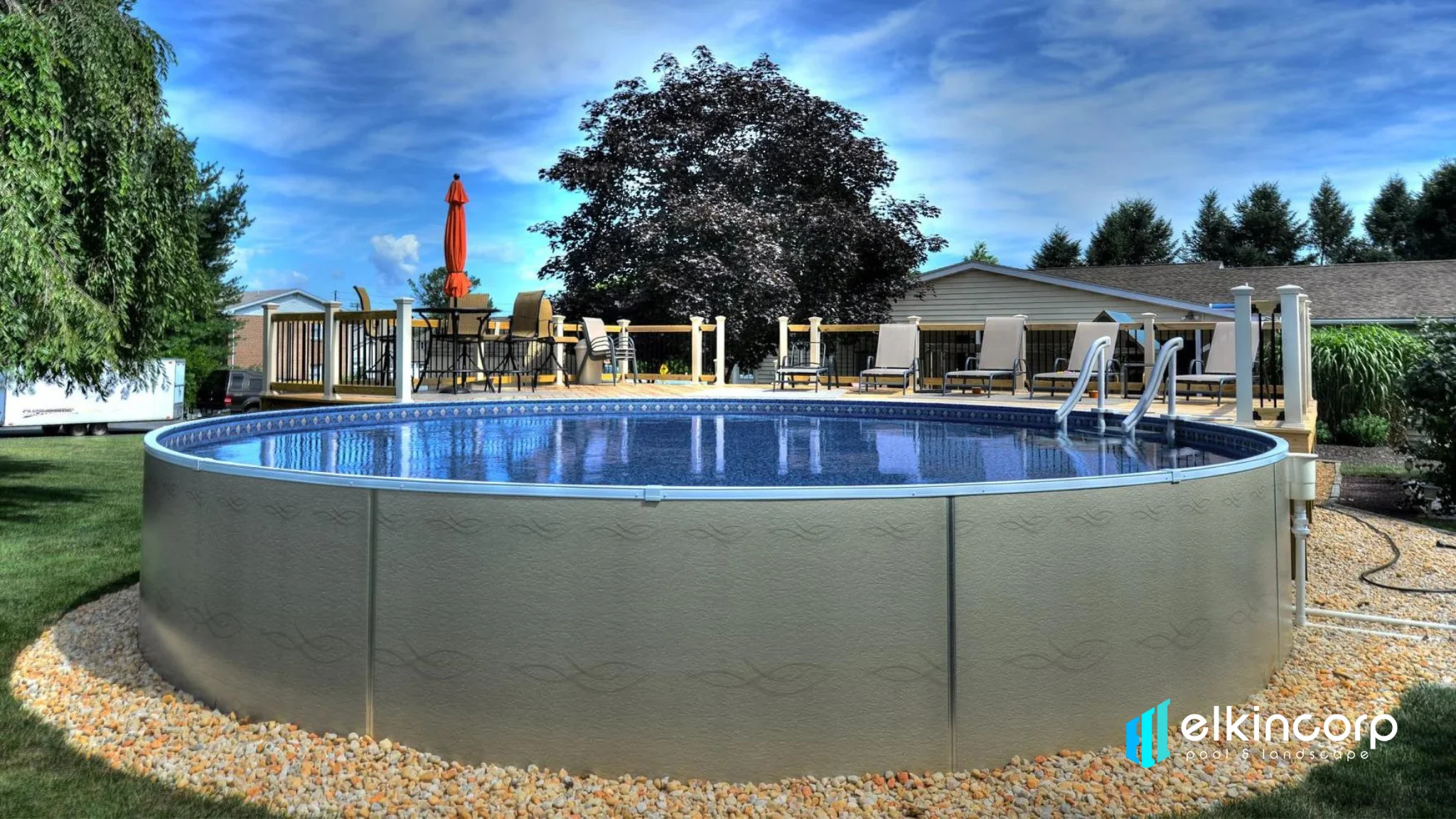
Read More
Key characteristics and advantages of above-ground pools.
It’s important to note that above-ground pools may not offer the same level of durability and longevity as in-ground pools. They are typically made of materials like steel, resin, or inflatable materials. Proper maintenance is crucial to prolong their lifespan.
When considering an above-ground pool, it’s crucial to assess your specific needs, space, and budget to determine if it’s the right choice for you. Additionally, the installation and maintenance instructions provided by the manufacturer should be followed to ensure the pool’s proper functioning and safety.
In-Ground Pools
An in-ground pool is a type of swimming pool that is constructed into the ground, typically by excavating a hole and constructing a pool structure within it. These pools offer several advantages and are a popular choice for homeowners and commercial facilities.

Read Also
Main characteristics and advantages of in-ground pools
In-ground pools are available in three primary types: concrete (gunite or shotcrete), fiberglass, and vinyl liner. Each has its own characteristics, advantages, and considerations.
Before installing an in-ground pool, it’s essential to carefully plan the design, budget, and necessary permits. Working with experienced pool contractors or builders is advisable to ensure the pool is constructed correctly and meets all prevailing regulations and safety standards. Proper maintenance and regular inspections will help preserve the pool’s appearance and functionality over time.
Concrete Pools
Concrete pools, also known as gunite or shotcrete pools, are a popular type of in-ground swimming pool known for their durability, flexibility in design, and long-lasting quality.
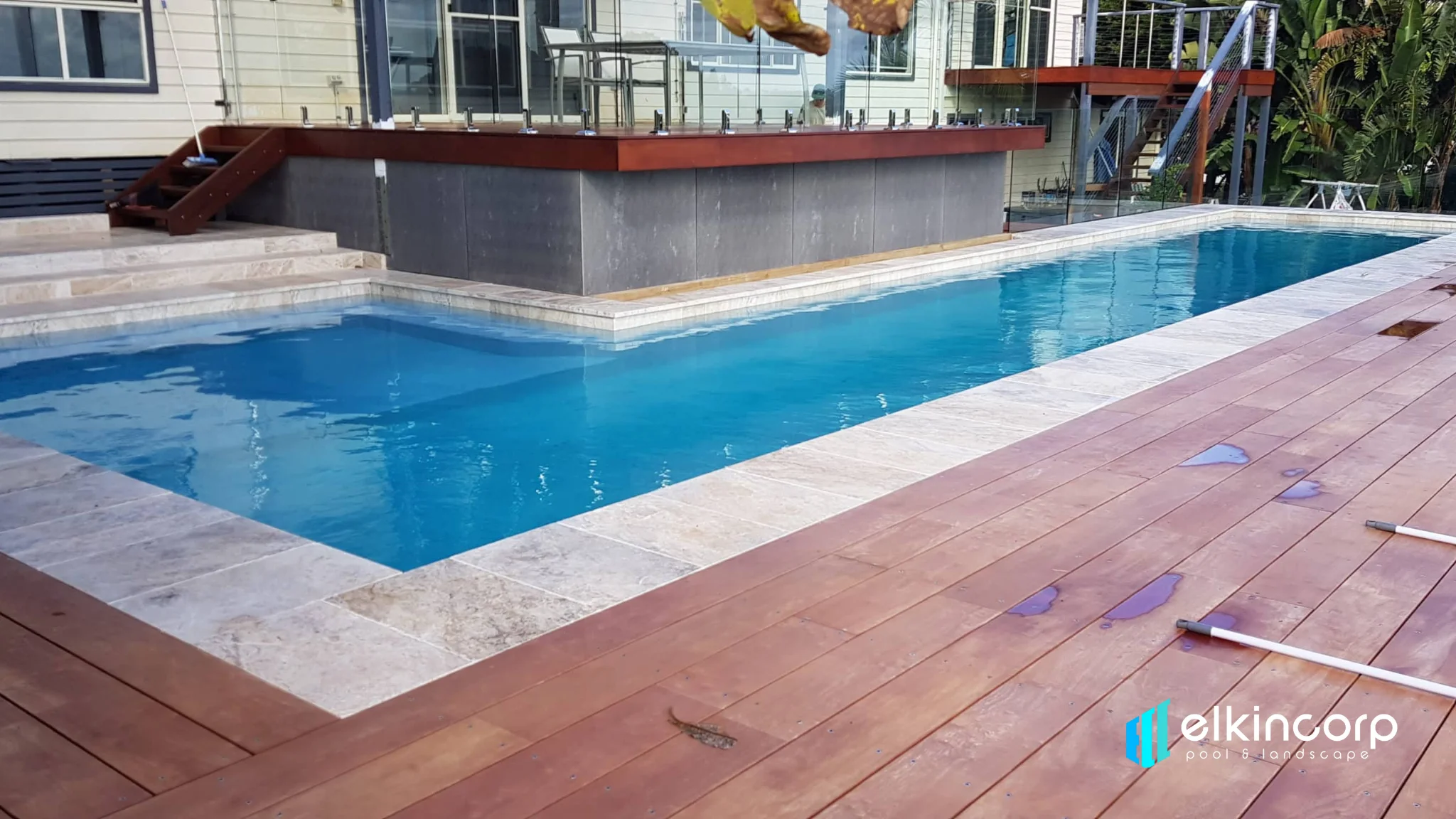
Read Also
Key characteristics and advantages of concrete pools.
It’s important to consider that the construction of a concrete pool typically takes longer compared to other pool types, and it may involve more disruption to your property during the installation process. Additionally, concrete pools can be prone to staining and may require occasional resurfacing.
Overall, concrete pools are an excellent choice for homeowners who want a durable and highly customizable pool that can provide years of enjoyment and increase the value of their property. Working with a reputable pool builder who specializes in concrete pool construction is crucial to ensuring a successful project.
Lap Pools
A lap pool is a specialized type of swimming pool designed primarily for the purpose of swimming laps and aquatic exercise. Unlike traditional recreational pools, lap pools are typically long and narrow, providing a straight and uninterrupted swimming path.
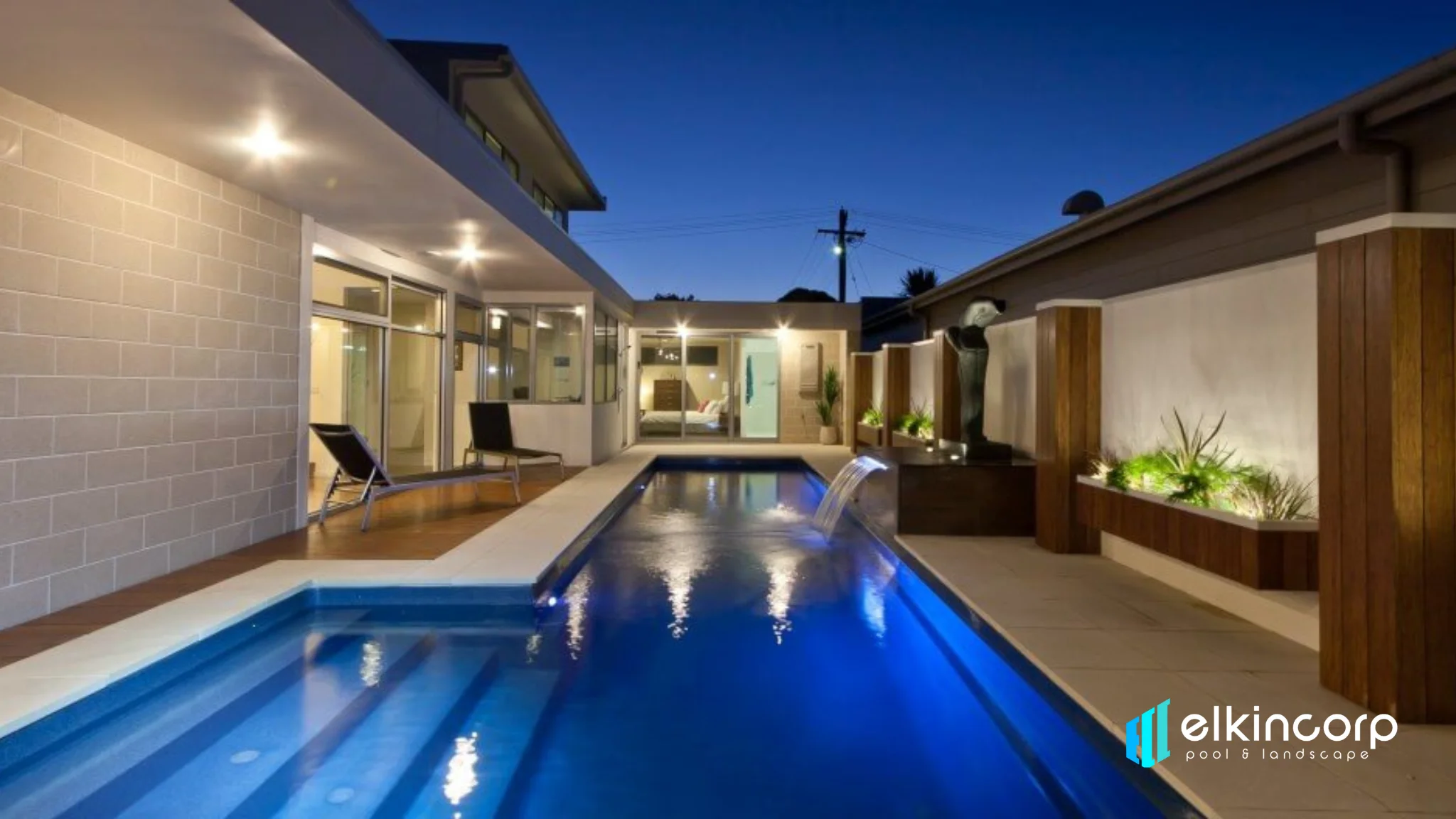
Read Also
Here are some key characteristics and advantages of lap pools.
It’s important to consider your specific fitness goals and available space when deciding to install a lap pool. If you’re looking for a pool primarily for leisure and relaxation or if you have ample space for a larger pool, a lap pool may not be the best choice. However, if regular exercise and swimming laps are your primary objectives, a lap pool can be a valuable addition to your property.
Swim Spas
Swim spas, also known as swim-in-place pools or endless pools, are a hybrid between a traditional swimming pool, a hot tub or spa. They are designed to provide a space for swimming, aquatic exercise, relaxation, and hydrotherapy.
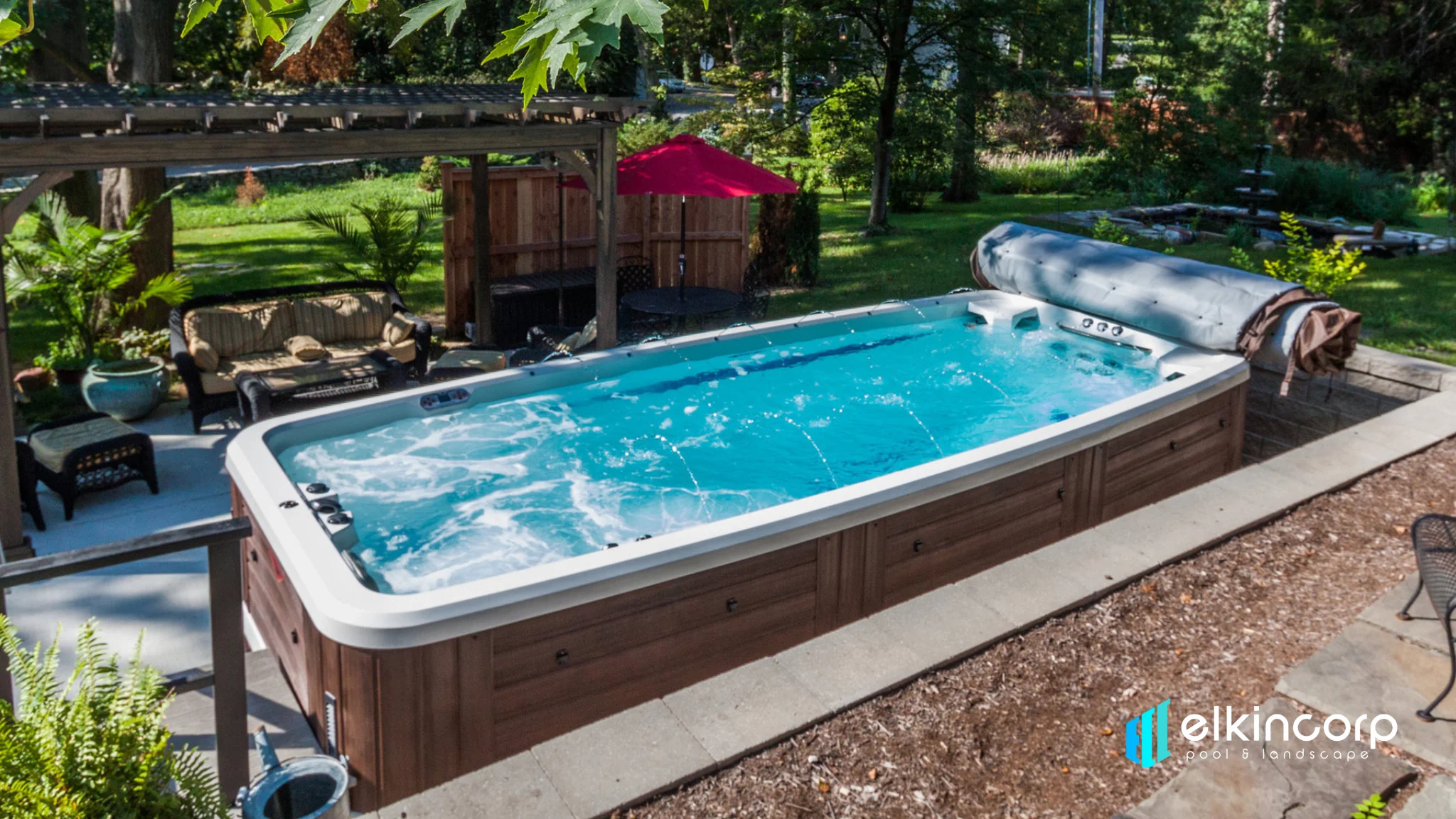
Read Also
Vital characteristics and advantages of swim spas:
Swim spas are a versatile and space-efficient solution for individuals and families who want to combine exercise, relaxation, and hydrotherapy in one compact unit. They are available in various sizes and styles, and the choice of features and accessories can be bespoke to meet your specific needs and preferences.
Hot Tubs and Spas
Hot tubs and spas are popular hydrotherapy and relaxation amenities that provide a variety of physical and mental health benefits. They are often used for leisure, stress relief, and physical therapy.

Read Also
Main characteristics and advantages of hot tubs and spas.
It’s important to consider factors such as budget, available space, and personal preferences when choosing a hot tub or spa. Regular maintenance and water quality management are necessary to ensure that hot tub or spa remains clean and safe for use.
Indoor Pool
An indoor swimming pool is enclosed within a building or structure, providing year-round access to a controlled environment for swimming and aquatic activities. Indoor pools offer several advantages and are suitable for various settings, including residential properties, hotels, fitness centers, and community facilities.
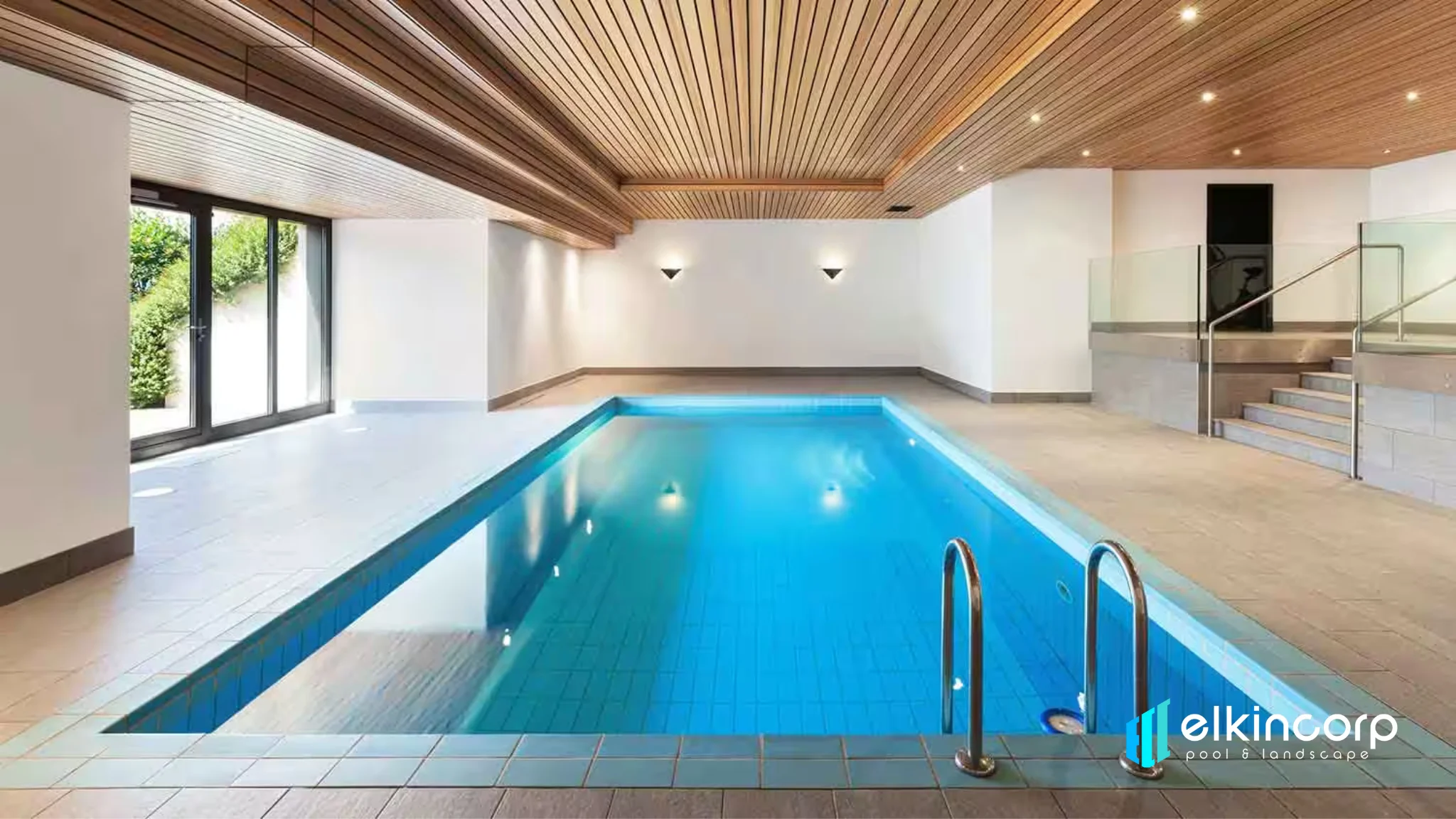
Read Also
Important characteristics and advantages of indoor pools.
It’s important to consider factors such as space availability, budget, and maintenance requirements when planning for an indoor pool. Additionally, proper ventilation and dehumidification systems are essential to maintain air quality and prevent moisture-related issues within the indoor pool area.
Natural Pool
A natural pool, also known as a swimming pond or a bio pool, is a type of pool that combines traditional swimming areas with a natural aquatic ecosystem. Natural pools are designed to provide a more environmentally friendly and aesthetically pleasing alternative to conventional swimming pools.
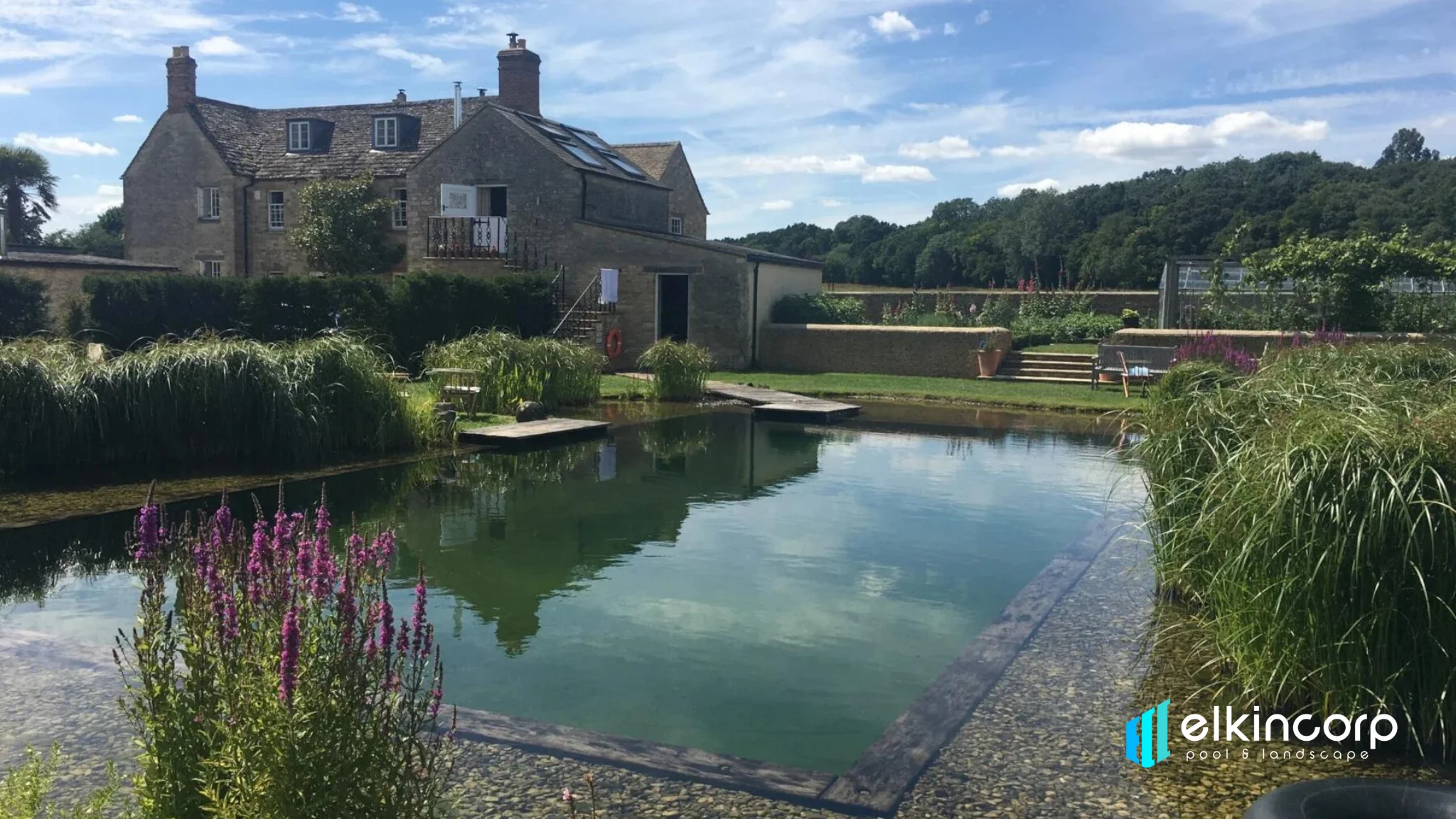
Read Also
Significant characteristics and advantages of natural pool.
It’s important to note that natural pools may require more space than traditional pools due to the inclusion of the regeneration zone. The design, construction, and maintenance of natural pools often require expertise in natural aquatic ecosystems. If you’re considering a natural pool, it’s advisable to work with experienced pool designers and landscape architects who specialize in this type of pool to ensure the success of the project.
Spool
A “spool” is a portmanteau of the word’s “spa” and “pool.” It is a small, compact, and often shallow pool that combines features of both a hot tub (spa) and a swimming pool. Spools are typically larger than a hot tub but smaller than a traditional swimming pool, and they provide a space for relaxation, recreation, and aquatic exercise.
Read Also
Key features and advantages of spools.
Spools are an excellent choice for individuals and families who want the benefits of both a hot tub and a swimming pool but have limited outdoor space. They offer a compact and versatile solution for relaxation, recreation, and aquatic fitness. Working with experienced pool designers and builders can help you create a spool that meets your specific needs and preferences.
Saltwater Pool
A saltwater pool, also known as a salt pool or salt chlorination pool, is a swimming pool that uses a salt chlorination system to sanitize and disinfect the water. Unlike traditional pools that rely on the addition of liquid chlorine or chlorine tablets, saltwater pools generate chlorine from salt dissolved in the pool water through a process known as electrolysis.

Read Also
Main features and advantages of saltwater pools.
It’s important to note that saltwater pools still require regular monitoring and maintenance to ensure the system is functioning correctly, and the water chemistry is balanced. Additionally, the salt used in the pool water needs to be periodically replenished as it can be lost due to splash-out, backwashing, and other factors.
Overall, saltwater pools can be an attractive choice for those who prefer a lower-chlorine swimming experience and appreciate the convenience and potential cost savings of a salt chlorination system. If you’re considering a saltwater pool, it’s essential to follow the manufacturer’s guidelines and perform routine maintenance to keep the system operating efficiently.
Plunge Pool
A plunge pool is a small, shallow, and typically cold-water pool designed for the purpose of a quick and invigorating dip or a plunge to cool off. Unlike traditional swimming pools, plunge pools are usually compact and not intended for extensive swimming or recreational use. They are often used for relaxation and as a contrast to hot tubs or saunas.
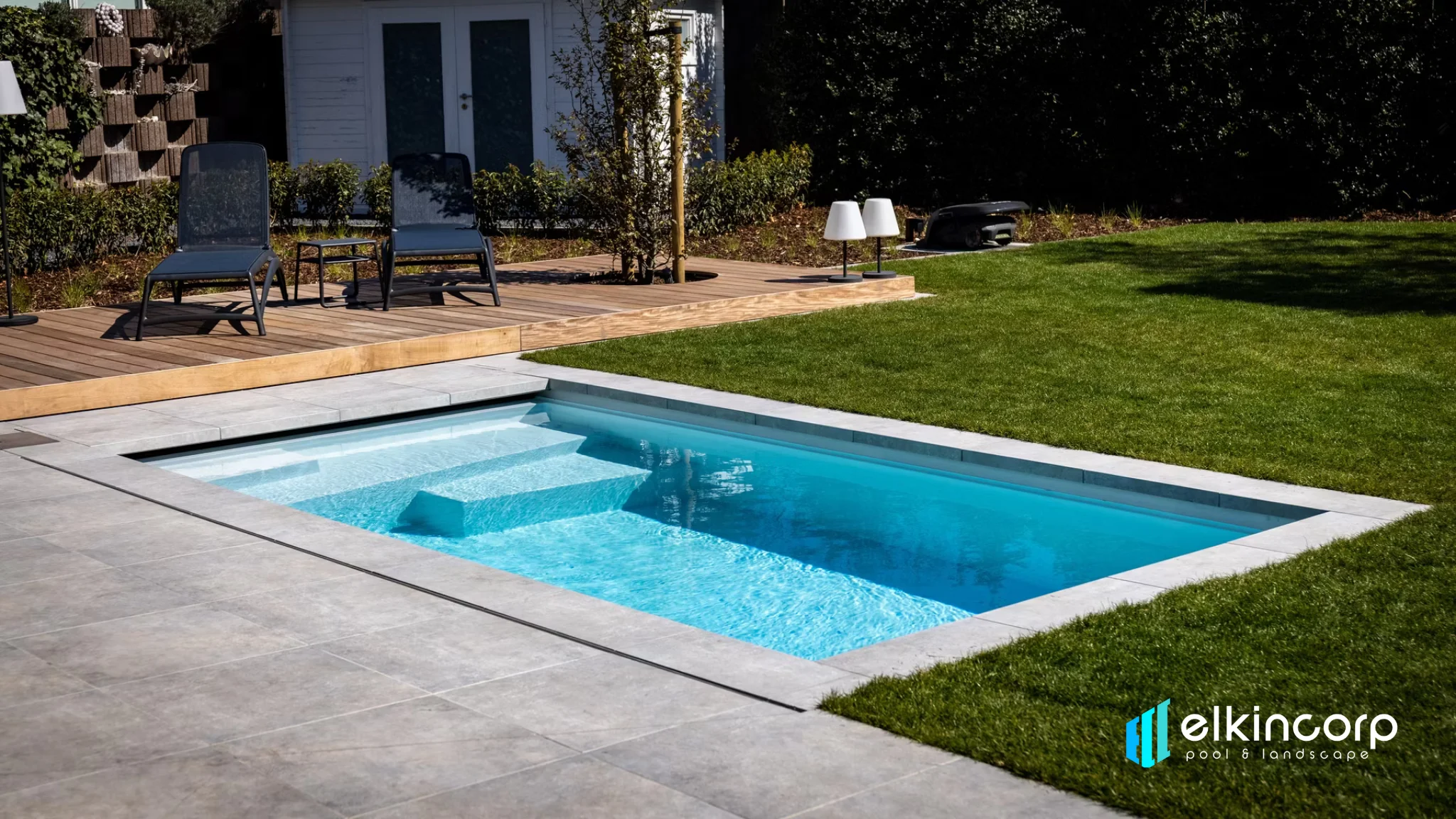
Read Also
Important characteristics and advantages of plunge pools:
Plunge pools are typically made of durable materials like concrete, fiberglass, or vinyl liner. They can be a valuable addition to outdoor spaces, especially in settings where relaxation and contrast bathing are desired. If you are considering a plunge pool, it’s essential to plan its installation, including location, size, and any accompanying features, to ensure it serves your specific needs and preferences.
Plunge pools are typically made of durable materials like concrete, fiberglass, or vinyl liner. They can be a valuable addition to outdoor spaces, especially in settings where relaxation and contrast bathing are desired. If you are considering a plunge pool, it’s essential to plan its installation, including location, size, and any accompanying features, to ensure it serves your specific needs and preferences.
To Sum Up
In this article, we’ve explored various pool shapes and styles, from infinity pools to geometric designs. These creations, skillfully brought to life by pool and landscape contractors, can transform your outdoor space into a harmonious and inviting retreat. Whether you prefer the dramatic illusion of an infinity pool or the precise lines of a geometric pool, there are options to suit every taste and property type. Consulting with experienced pool and landscape contractors is key to making your outdoor oasis a reality.
